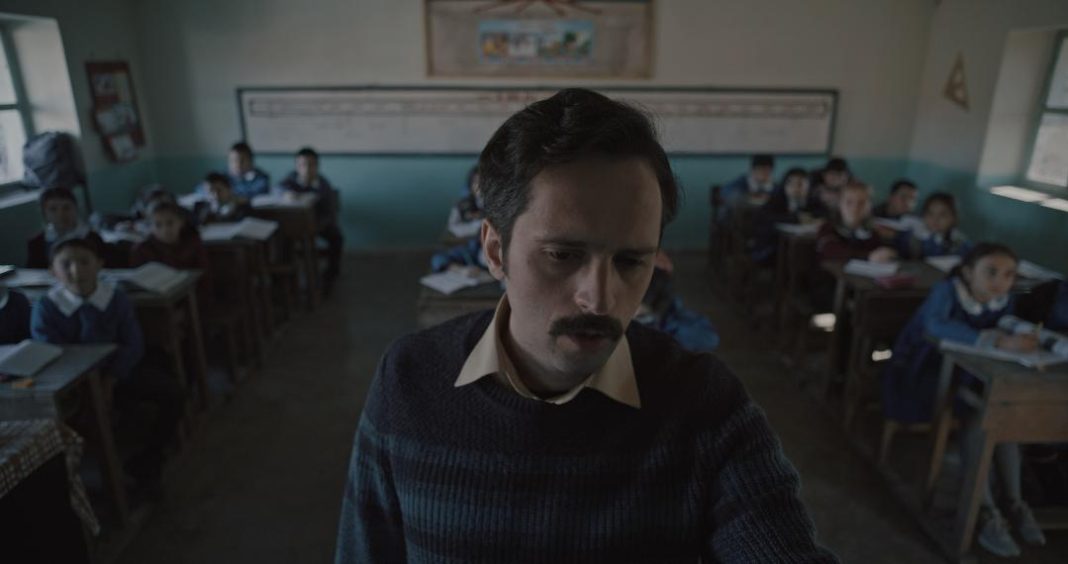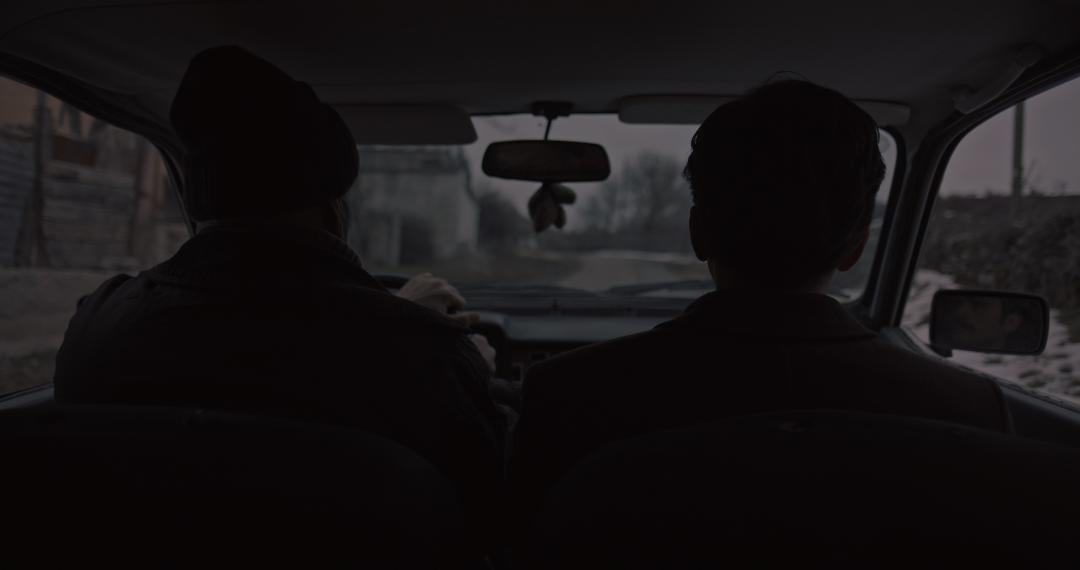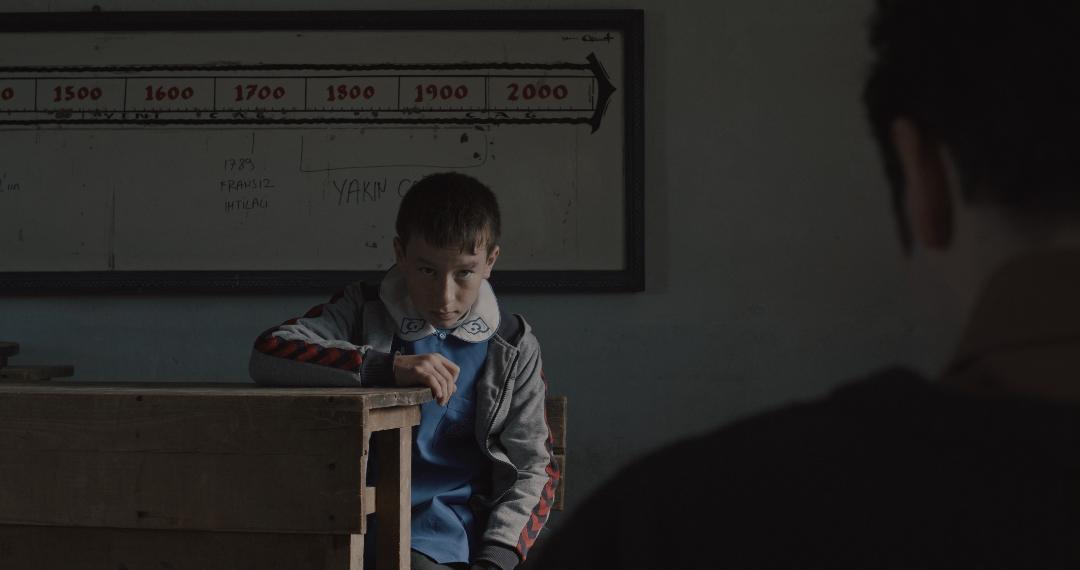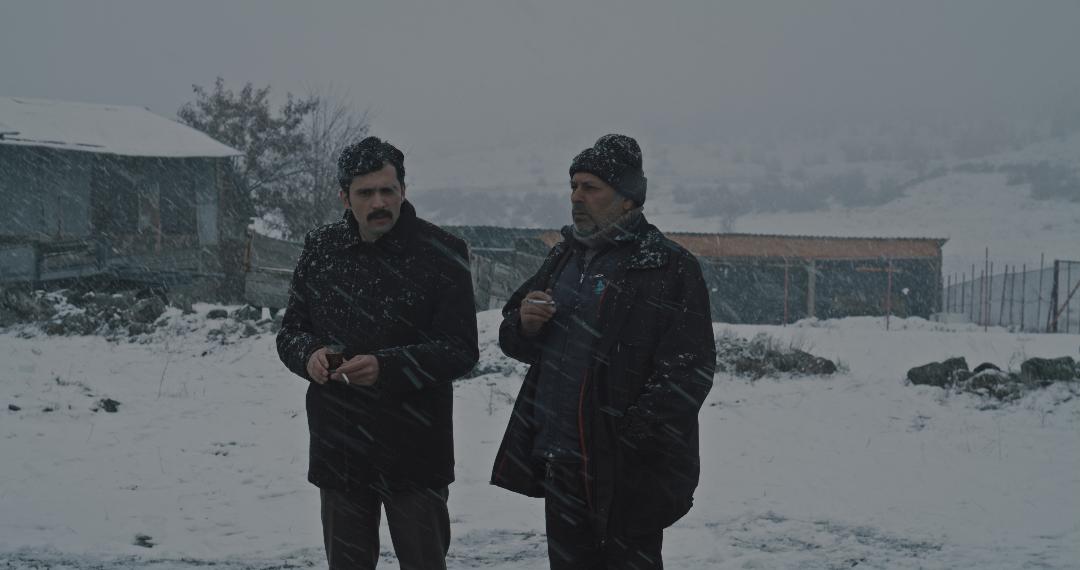Our main theme in this story, in which we travelled deep into the human soul, began with the question “How do we fight evil?
While discussing the issues of good and evil with Muhammed Furkan Daşbilek, the screenwriter of our film The Moisture, we came up with the argument that every human being can contain both good and evil. Many different stories and characters emerged around this idea. We had to make a choice.
Then, with the note of the story of a missing girl, our story began to take shape. Our scenario emerged around geography, destiny, class issues, the isolation of the countryside and the issues of good and evil.
The main backbone of the story is the conflict between a teacher doing his duty in the Anatolian region, on the one hand, and the custody problem with his recently divorced wife, on the other hand, and the conflict with a mischievous student who brings out the darkest sides of him.
We can say that our starting point on the axis of this conflict was to show how the way people struggle with evil changes the fate of many issues.
The rural world explored in the film is very wide in terms of location, but very intimate. How did you achieve a balance between the two?
Anatolian geography has such a side. If you look at it from a distance, it may seem desolate, barren, frightening and isolated. But when you enter it, you feel its sincerity.
In fact, geographies are similar to each other. It is people who make these places meaningful. The feeling that the world we build in the film is both vast and sincere is directly proportional to the moods of the characters you see in the film. Sincerity is directly related to reality.
I think what makes our film sincere is that it feeds on reality. What is this reality that we focus on? The good and bad sides of every human being. Some of us can fight these bad sides, but some of us can succumb to them. This is the difference between good and bad.
Especially the character of the Teacher, who experiences this dilemma and sees the consequences, is the best example of what we are talking about.
Tell us about your cast.
Our teacher character, Mücahit Koçak, is an actor who has made a name for himself in Turkey with his successful work.
When designing the character of Ishak in the story, we took Mücahit’s physical and characteristic features as a reference. It is usually difficult to convince actors for a short film. We also struggled a lot, but in the end Mücahit liked the story and became a part of the project😊
Okan Selvi, who plays the role of a school attendant, is one of the most sought-after faces of TV series and films. In the film The Moisture, he brought to life a desolate, sinister school guard. It was a lot of fun for us to work on an unpredictable character with someone who has been a comedy actor for many years.
Our child character Yusuf (Muhammed Mayda) had never acted in a film before. Muhammed, who is the child of a farming family in a village in the geographical area where we shot the film, made us very happy with his natural talent. Sometimes working with non-professional actors can take you to limits that you cannot foresee.
Yusuf’s friend Ismail was played by Baran Salman, who worked with us in our film Naftalin. Baran has such a talent. He can memorise every page of the script. And he can tell you one by one where and what happened. It is impossible to make a mistake with him on the set 😊
Tell us about your production team.
We are here with The Moisture, the fourth short film by our team, which we founded in 2015.
With the films The Harvest Time in 2016, Naphthalene in 2018, At a Riverside in 2020 and The Moisture in 2022, we won screenings and awards at national and international festivals.
We continue to produce films with Furkan Daşbilek, Mustafa Yeşilova, Engin Cebiroğlu and Mehmet Ağbaba, with whom we have shared the same dream for about 8 years.
Furkan, the producer and screenwriter of our film, is a cinema lover and a very passionate person. You can understand how passionate he is when he tells you a story by the emotions he evokes in you. Those who see the story of The Moisture will understand what I mean.
Mustafa, the cinematographer of our film, has very strong intuition, visual intelligence and skills. The fact that we have been friends for years is reflected in the sincerity of the visual world of the stories. Mustafa is the apple of our eye.
Engin Cebiroğlu is the co-producer of our film and also the colourist. I met Engin, one of Turkey’s leading colourists, at university. Since then, our relationship has continued to grow. We have made a total of 5 films with him. Ramazan Kılıç is the co-producer of our team. Ramazan is also a short film director. He has his own films that have been screened and awarded at many international festivals.
And Mehmet Ağbaba, who made the music for our film. Mehmet is a crazy fan of Hans Zimmer. We trust him to do the music for our films. He is very talented and modest. He manages to surprise us every time.
Where did you shoot and for how long?
We shot our film in the province of Bolu, between Istanbul and Ankara. We had a 2-month general preparation process and a 10-day preliminary preparation process. In this process, we did the reading and costume rehearsals. We completed the shooting by experiencing 4 different seasons in 5 days 😊.
Who and what are your key cinematic influences?
After graduating from university, I was introduced to cinema, and after watching the films of filmmakers such as Bela Tarr, Kubrick and Bergson, I began to form ideas in my head about what kind of cinema I should be making.
Jung and Adler readings I did over time made me more interested in the depths of the human psyche and how I could translate that into cinema. Human stories and fascinating events have captured the attention of us all. I think that following these emotions will affect me as well as the people who watch my films.
What was the spark that got you into film-making?
In my childhood, I found myself shaping the fairy tales I heard my mother tell into my own imagination.
The books I read, the stories I heard, the films I watched made me a storyteller. As time went by, my observations of nature and people made me more and more competent in this way. I had several film experiments during my student years, but I couldn’t get the results I wanted because I was still in the learning phase.
Then I met Furkan and we accelerated the process of putting these characters that had accumulated in my past into films.
What issues and themes are you keen to explore in future work?
I want to make an epic, historical film.
It has to be the most important situation that affects me deeply. Imagine you are in a geography where mankind has lived intensively for millions of years and where important events in history have always taken place.
Since the first paintings on cave walls, people have been passing on their knowledge through various forms of art. I think these accumulated layers of culture have penetrated my genetics. For this reason, I think the most exciting feeling for me would be to blink from today into the past.
Until I try that, I may continue to make films in different styles and themes.
How does education in a locality like the one we see in the film differ from that in a big city?
The school we see in the film has a caretaker. But in village schools like this one, the teacher is everything.
Sometimes he paints the walls, sometimes he lights the stove, sometimes he acts as a wise man for the villagers. In the past, there used to be more village schools like the one in the film because of the large population in the villages.
But in our recent history, as the population in the villages has decreased, most of the village schools have been closed. With the development of industry and technology and the emergence of new job opportunities, people migrated to the cities and the village population gradually decreased.
Teachers who come from elsewhere, settle in the village and continue their lives here, become role models for the villagers. They illuminate the dark paths of these people who live like a closed box between the mountains.
That is why the figure of the teacher has a very important place in our culture. They are like engineers who build society.
Would you like to expand on this short into a feature project?
After the script was finished, Furkan and I discussed it a lot. The feeling the film left was like being part of a feature film. We also heard this comment from the audience and the critics. But in the end, The Moisture turned out to be a short film. I don’t know what time will show, but maybe in the future.
How has the festival circuit helped your film?
Festivals are very important for the visibility of a film. Screenings, interviews and, of course, awards all help to raise the profile of a film.
At the 79th Venice Film Festival, in the Orizzonti section, we had the world premiere. Being visible at such a big festival puts you on the radar of other festival programmers.
38th Santa Barbara Film Festival programmer Natalie Gee discovered Rutubet in Venice and included it in her festival’s programme. With Santa Barbara’s Bruce Corwin Award for Best Short Film, we qualified for an Oscar submission. So as you can see, festivals have a positive impact on both the film’s career and your own.
Finally, what are you most proud of about this short?
After 23 years, we are very proud to be a Turkish short film at the Venice Film Festival.
Being part of such a big festival is the dream of every young filmmaker. It was an unforgettable experience for us to be in the centre of a film organisation that we have been following from afar for years and to experience this atmosphere.
In addition, the beautiful comments of the American audience at the 38th Santa Barbara Film Festival made us very proud. I love this universal quality of cinema, which can unite different cultures, languages and religions around the same feelings. I am happy that cinema exists!
































